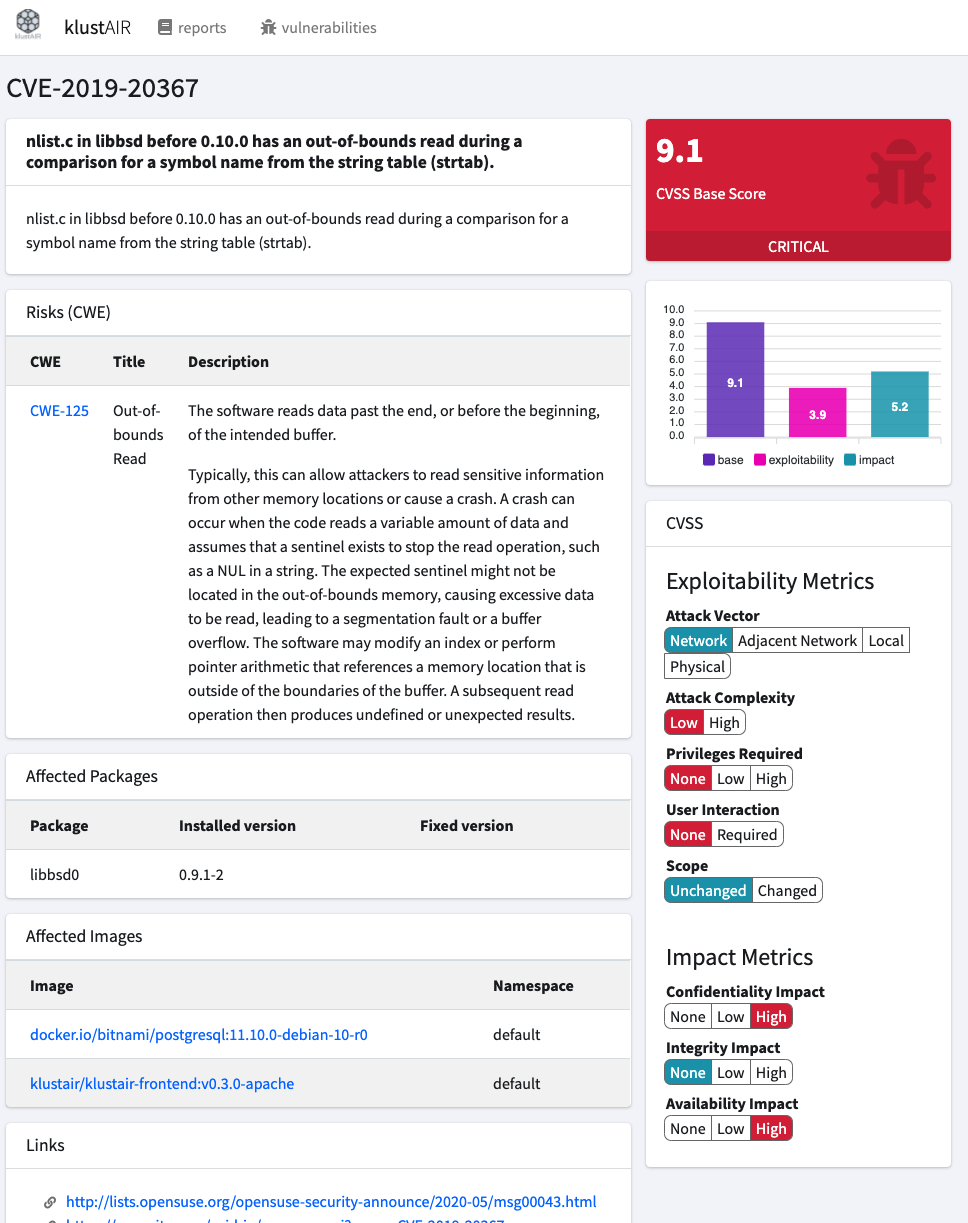Klustair collects all the used images your Kubernetes namespaces and runs a trivy scan on them.
Demo : https://klustair.herokuapp.com/
- Klustair Frontend to view the scanner results
- Klustair Runner to collect and scan all your used images with trivy
- trivy A Simple and Comprehensive Vulnerability Scanner for Containers and other Artifacts
- kubeaudit kubeaudit helps you audit your Kubernetes clusters against common security controls
- anchore-engine (DEPRECATED) A service that analyzes docker images and applies user-defined acceptance policies to allow automated container image validation and certification
Read the upgrade instructions here
The key consists of 32 random characters
Chose one of the following commands to generate one or copy the Laravel key from https://wwww.keygen.io
dd if=/dev/urandom bs=1 count=32 2>/dev/null | base64
or
date +%s | md5 | base64 | head -c 32 ; echo
of
openssl rand -base64 32
export RELEASENAME=my-klustair
kind create cluster --config kind.yaml
kubectl apply -f https://raw.githubusercontent.com/kubernetes/ingress-nginx/main/deploy/static/provider/kind/deploy.yaml
kind export kubeconfig --name klustair --kubeconfig ./kubeconfig
helm install $RELEASENAME ./klustair -f ./klustair/values.yaml -n $RELEASENAME --create-namespace --set-file klustair.kubeconfig=./kubeconfig
You should be able now to access your installation via http://local.klustair.com (pointing to 127.0.0.1) or the defined URL in values.yaml. the Klustair Admin credentials a visible in first Database init run. If you lost your Admin Account or need more Accounts use the "php artisan klustair:user" command on apache or php-fpm pod.
helm list
helm uninstall $RELEASENAME
kind delete cluster $RELEASENAME
trivy.repoCredentials and klustair.gcloudCredentials are optional
export RELEASENAME=my-klustair
helm repo add klustair https://klustair.github.io/klustair-helm
helm install \
--set klustairfrontend.url=your.klustair.domain.com \
--set klustairfrontend.appkey=base64:<put your generated Laravel key here> \
--set-file klustair.kubeconfig=/path/to/your/kubeconfig \
--set-file trivy.repoCredentials=/path/to/your/repocredentials.json \
--set-file klustair.gcloudCredentials=/path/to/your/gcloudcredentials.json \
$RELEASENAME klustair/klustair
Follow this instruction to generate Google Serviceaccount and credentials
https://ahmet.im/blog/authenticating-to-gke-without-gcloud/
export RELEASENAME=$(helm list | grep klustair | awk '{print $1}')
kubectl delete secrets $RELEASENAME-configs
kubectl create secret generic $RELEASENAME-configs \
--from-file=kube.config=/path/to/your/kubeconfig \
--from-file=repo-credentials.json=/path/to/your/repocredentials.json \
--from-file=gcloud-credentials.json=/path/to/your/gcloudcredentials.json
https://github.com/klustair/klustair/blob/master/repo-credentials.json.example
You find a full list of all Chart values here:
https://artifacthub.io/packages/helm/klustair/klustair?modal=values-schema
| Key | Type | Default | Description |
|---|---|---|---|
| image.repository | string | klustair/klustair |
repository of the klustiar runner |
| image.repositoryFrontend | string | klustair/klustair-frontend |
repository of the klustair frontend |
| image.tag | string | v0.2.2 |
|
| image.pullPolicy | string | Always |
|
| klustairfrontend.appkey | string | example key | Laravel App Key |
| klustairfrontend.url | string | example URL | Frontend URL |
| klustair.kubeconfig | multiline string | example config | kubectl configuration |
| trivy.enabled | boolean | true |
|
| trivy.timeout | string | "2m0s" |
|
| trivy.repoCredentials | multiline string | example JSON | |
| postgresql.postgresqlUsername | string | klustair |
|
| postgresql.postgresqlDatabase | string | klustair |
|
| postgresql.persistence.storageClass | string | "-" |
|
| postgresql.persistence.size | string | 1Gi |
|
| postgresql.resources.requests.memory | string | 256Mi |
|
| postgresql.resources.requests.cpu | string | 250m |


